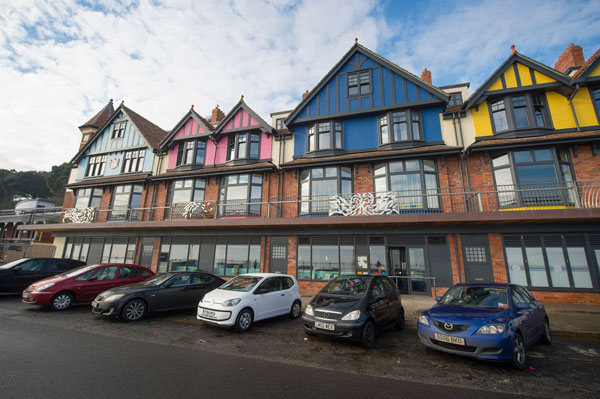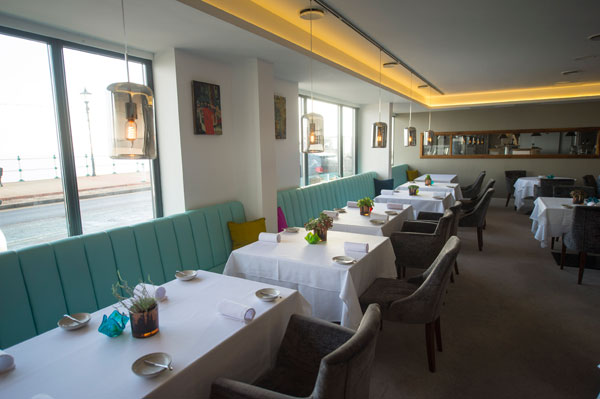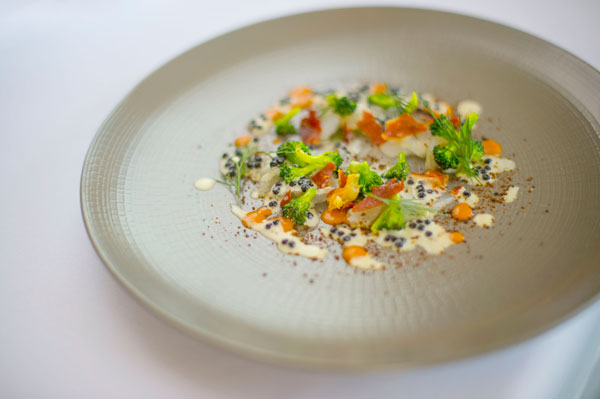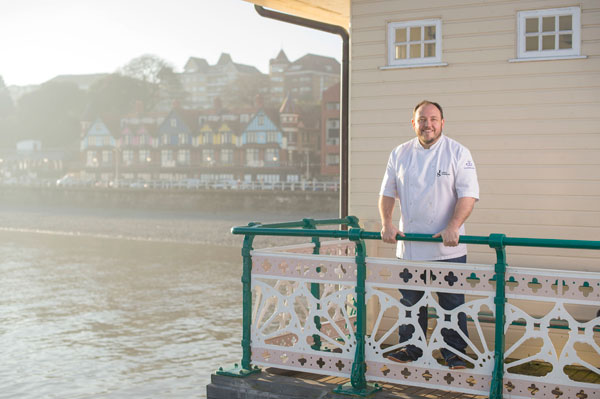Chef profile: James Sommerin, Restaurant James Sommerin
While James Sommerin is proud of his accolades, among them a Michelin star and AA Restaurant of the Year for Wales, he's prouder still that his restaurant is a family affair, writes Katherine Price
It's late morning when The Caterer arrives at Restaurant James Sommerin in Penarth, and it is full of Sommerins young and old following James's daughter Georgia's 18th birthday party the night before. The vacuum cleaner is out, and balloons and gifts are being cleared away. To say that the restaurant, located in the quiet seaside town five miles from Cardiff, is a family-run business is an understatement.
Sommerin himself is, of course, in the kitchen, his wife Louise works front of house with her two sisters, and Georgia was recently promoted to chef de partie.
kitchen. After he left school he started at a local hotel, the Cwrt Bleddyn in Usk, before moving to Scotland for five years to work under Richard Lyth at the Farleyer House hotel in Aberfeldy - the man he says really instilled in him a passion for ingredients and cooking.
Wales calling Another person Sommerin credits with inspiring him is fellow Welshman Hywel Jones, the Michelin-starred executive chef at Lucknam Park in Wiltshire. "I remember watching a programme about Hywel Jones on TV years ago and I thought, I want to be like that man. I want to get a star. I'm Welsh; I want to be back home doing this."
His first child, Georgia, came along when he was 20 and still in Scotland - one year later he was back in Wales. He says having a young family helped make him more focused and driven: "My career had to work. You've got to make a living. I had a family to support."
He spent 10 years at the Crown before it closed unexpectedly in 2013 due to financial problems, and he opened Restaurant James Sommerin in May 2014. Like most restaurants these days, Sommerin places a heavy emphasis on seasonality and locality, making use of the great produce on his doorstep. He gets his meat from a family butcher, Douglas Willis, in Cwmbran, and his fish from E Ashton Fishmongers in Cardiff, and he wants to develop his own kitchen garden eventually - one of many developments on the cards.
e recent such addition to the restaurant is a write-on, wipe-off glass door between the private dining room and main dining room, on which sketches and writings about the dishes surround the embossed 'JS' logo. Like many chefs, Sommerin has a notebook in which he draws and writes his ideas, but with so many people asking him where the inspiration for dish-building starts, he wanted to display part of the process to his guests and 'bring the notebook out to the customers'.
It's also a talking point. "I like it when people ask 'what's all that crap on the wall?'," he laughs. The sketches reveal a rhubarb dessert is on the cards, as well as Sommerin's pea ravioli dish that took him to the final of Great British Menu, along with aerated chocolate and a banana, stout and peanut dessert.
Vikings in the family Another source of inspiration is other restaurants - the family had planned a foodie trip as a surprise for Georgia's birthday, but Sommerin says it would also be an educational trip.
In the past year they've been to L'Enclume in Cartmel, Cumbria; Alain Ducasse at the Dorchester, London; Geranium in Copenhagen; Frantzén in Stockholm and Restaurant Andrew Fairlie in Auchterarder, to name a few.
"We try to get out and see what other people are doing," says Sommerin. "When you cocoon yourself in your business, you've got to see the bigger picture. If you can take away just one little element to help improve yourself or your team, it's worth the bill at the end, isn't it? Or the 10-hour drive there and back."
Norway in particular was an eye-opener. As well as experiencing restaurants such as Maaemo and Statholdergaarden in Oslo, the trip included research into the Sommerin family history.
"I never realised Norway was so bloody big," says Sommerin. "We got out there and went through the family records. We thought the family was originally from Oslo, and it turns out they were from Grimstad. We just thought we'd get on a train and it was five hours away."
Another valuable learning experience has been the introduction of chefs serving the dishes from the tasting menu. Sommerin is particularly engaged with his guests and may serve a table two or three times during the meal, allowing for direct engagement and feedback - good and bad.
"It's important for the junior members of staff to come out and have conversations with customers - and the customers are really honest. It builds confidence; it helps them develop as individuals. When some people tell you it's been the best food they've ever had, it's really uplifting, for all the guys."
A big proportion of Sommerin's customers are from the local area - Cardiff, Penarth, Barry and Swansea - and he's clearly aware of the importance of engaging with the local community. He also has a significant following among the older visitors who make it in once or twice a month for a special treat and have 'their table'. "We treat them like family to an extent because that's massive support for us," he explains.
Aiming for the stars
As much as he appreciates the local support, it was always the hope that he would also gain Michelin's seal of approval. "It was really important, on a personal level more than anything else, just to know that I could do it again," he says. The trophy and certificate have pride of place in the restaurant's front window.
I ask him why he thinks it took two years for the restaurant to win a star, while the Crown at Whitebrook, which reopened, rebranded as the Whitebrook and recruited Raymond Blanc-trained chef Chris Harrod, re-secured its one-star status in 2015. "We weren't worthy of a star then," he answers straight. "Things have to be right. Michelin came out seven weeks after we opened. We were never going to make the first guide because it was too soon.
"The second year we didn't get a star, I was really disappointed, but it's only going to happenwhen you're ready for it to happen. You've got to be happy, really confident in what you're doing, and enjoying it. And I certainly didn't for the first two years. It was really hard. We opened with eight chefs and within six months we'd dropped to three, and then to two. At one stage it was just me and my sous chef and we'd be doing anything up to 40 or 50 covers. You've got all those other things to contend with - it's not just cooking; it's making sure the bills are paid and organising the behind-the-scenes stuff."
nkfully, the restaurant now runs on a brigade of seven, and all Sommerin's chefs get a three-day weekend. "We increased the team to pull the hours down on the guys so they've got a bit more of a life," he explains, although he admits finding good staff in the area has been difficult. So it's useful, perhaps, that one of his chefs is home grown. What's it like working with his daughter? "Georgia is smashing it out. She could run every section of the kitchen," he says.
"We don't have to talk. Because she's worked for me for such a long time [Georgia joined the restaurant part-time at the age of 13] I don't have to ask for anything. It's cool - I love it, actually. There's something lovely about watching her work because she's very meticulous and I know that I've helped shape that."
Bright horizons
And what lies ahead, both for the business and Penarth, which at the time Sommerin was launching his restaurant was undergoing a massive regeneration to transform it from a run-down seaside town into a major tourist attraction?
After a £4.2m refurbishment, the pier pavilion fully reopened seven months after the restaurant.
"It's certainly on the up down here; this area's really thriving," says Sommerin, praising the Vale of Glamorgan Council for its approach to Penarth's regeneration. However, he suggests that more could be done to champion
Wales as a destination.
"When I was in Scotland, it promoted itself really well, and I think Wales could promote itself a lot more. I'd love to see another couple of Michelin stars down here. There are some really good chefs kicking around and hopefully they will get the recognition before long. If we could get a few more stars for Wales, a lot more people would travel down here."
Business, in the meantime, is steady and the restaurant already has 20 people booked for New Year's Eve. Sommerin says January has been "pretty good". The rooms are selling well too, although he adds they could be making more, but he's hoping to see a big uplift this year following the regeneration.
But ultimately, as driven as Sommerin is (and he does want two stars), the one thing he will never sacrifice is the restaurant's family atmosphere.
"I want to produce the best for my customers, but not lose that family feel, because we're a family restaurant. If you're coming here, it's for us, he says."
And thankfully, nobody is asking him to change that.
Launching the restaurant
Property developer Richard Hayward approached Sommerin in 2012 about the £6m Beachcliff scheme, the Georgian property on the Penarth seafront he was redeveloping.
"He gave me a plan with 3,500 sq ft on it and said, 'There you go, what do you think you would do with that?'" says Sommerin.
e restaurant kitchen is designed around the Bonnet Maestro Classic stove, which was custom-made in France. Sommerin sank £500,000 into the restaurant, funded through Ignition Credit, and has managed to very nearly pay it off - all worth it, he says, because he wanted a kitchen that would last.
The kitchen, originally planned for the back of the building, had to be on the front for deliveries, so Sommerin decided that it might as well be on show.
Although he originally wanted an open plan kitchen, it came down to having a strip window at a height where diners can see in. And like the restaurant itself, the kitchen has a stunning view over the promenade.
"I couldn't ask for a better view to be looking out on," he enthuses. "It makes you feel good when you can stand and look out the window for two minutes. It's pretty special."
They have since invested another £250,000 in lowering the windows, adding new seats, a screen at the entrance, mirrors in the private dining room and a new carpet.
Sommerin also wants to rip out and redesign the bar and change the lighting.
From the menu
Starters
•Pea 'GBM', Parmesan, sage and Serrano ham £9
•Wood pigeon, black pudding, raspberry and beetroot £9.50
Mains
•Sea bream, langoustine, chickpea and artichoke £22
•Welsh lamb, broad bean, pink turnip and cumin £26
Desserts
•Strawberries and cream, vanilla, white chocolate £9
•Kalamansi, black sesame and orange blossom £9
Continue reading
You need to be a premium member to view this. Subscribe from just 99p per week.
Already subscribed? Log In














